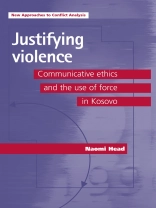When is the use of force for humanitarian purposes legitimate? The book examines this question through one of the most controversial examples of humanitarian intervention in the post Cold War period: the 1999 NATO intervention in Kosovo. Justifying Violence applies a critical theoretical approach to an interrogation of the communicative practices which underpin claims to legitimacy for the use of force by actors in international politics. Drawing on the theory of communicative ethics, the book develops an innovative conceptual framework which contributes a critical communicative dimension to the question of legitimacy that extends beyond the moral and legal approaches so often applied to the intervention in Kosovo. The empirical application of communicative ethics offers a provocative and nuanced account which contests conventional interpretations of the legitimacy of NATO’s intervention.
Tabela de Conteúdo
Contents Preface Acknowledgements Abbreviations Introduction Part I 1 Locating Kosovo and legitimacy 2 Putting out the fire while the coals still burn: Kosovo prior to 1999 3 Communicative action in International Relations Part II 4 The Habermasian project: dialogue as normative grounds and object of critique 5 The communicative imperatives 6 Applying the communicative imperatives: debating Kosovo 7 Conclusion Bibliography
Sobre o autor
Naomi Head is Lecturer in Politics at the University of Glasgow












